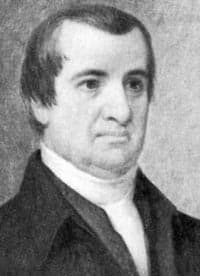Abraham Clark (February 15, 1726 – September 15, 1794) was a signer of the Declaration of Independence and delegate for New Jersey in the Second Continental Congress. He did not participate in the First Continental Congress.

Little is known of Clark outside of his public service. He served in the House of Representatives until his death in 1794. During the Second Continental Congress, he served alongside fellow New Jersey delegates: John Witherspoon, Francis Hopkinson, John Hart, and Richard Stockton.
Jump to:
Abraham Clark's Life and Career
Clark was born in New Jersey on February 15, 1726, and at a young age established himself as a math prodigy. He was tutored in the trade of surveying, which gave him a steady income that allowed him to pursue an education in law.
He graduated from law school and passed the bar. He set up his own practice and quickly gained a reputation as a man for the little man and would defend many who could not afford a lawyer.
He was known for his integrity and his character during the years of his law practice.
Abraham was not as privileged as some of the other signers of the Declaration of Independence. However, his father had enough money to give him an education he was not sent to the finest of schools. Clark worked extremely hard, developed a solid work ethic, and learned to become resourceful. His natural ability in math would aid him throughout his life and career.
In 1748, at the age of twenty-two, Abraham Clark met Sarah Hatfield. It would not be long, and he reliquished his life as a bachelor, and the two were married.
Abraham and Sarah gave birth to ten children.
He was known to his children as a strong father figure. Abraham did his duty as the breadwinner and gave his wife and children a good life. Although he was not raised wealthy, his resourcefulness gave him a sizable estate.
Clark pursued a career in politics and was elected to the Provincial Congress in 1775 and was sent as a delegate of New Jersey to the Second Continental Congress after the state replaced the delegates not for independence from Great Britain.
Clark was a leading voice in New Jersey for independence, and that carried over into the Continental Congress. He would serve in the Congress through 1778.
Two of Clark's sons were officers in the Continental Army and were captured by the British. They were tortured and beaten by the British due to their father's signature on the Declaration of Independence and were placed on the prison ship Jersey. Aboard the Jersey, Captain Clark was thrown into a dungeon where he lay in his own urine, feces, and blood. He was fed very little, and his father learned of it and raised the issue to Congress. It was the only time that Abraham Clark mentioned his sons who served in the army. The British responded by improving his conditions.
He retired from public service in 1794 and died of sunstroke that September. His epitaph reads:
Firm and decided as a patriot,
zealous and faithful as a friend to the public,
he loved his country,
and adhered to her cause
in the darkest hours of her struggles
against oppression.

